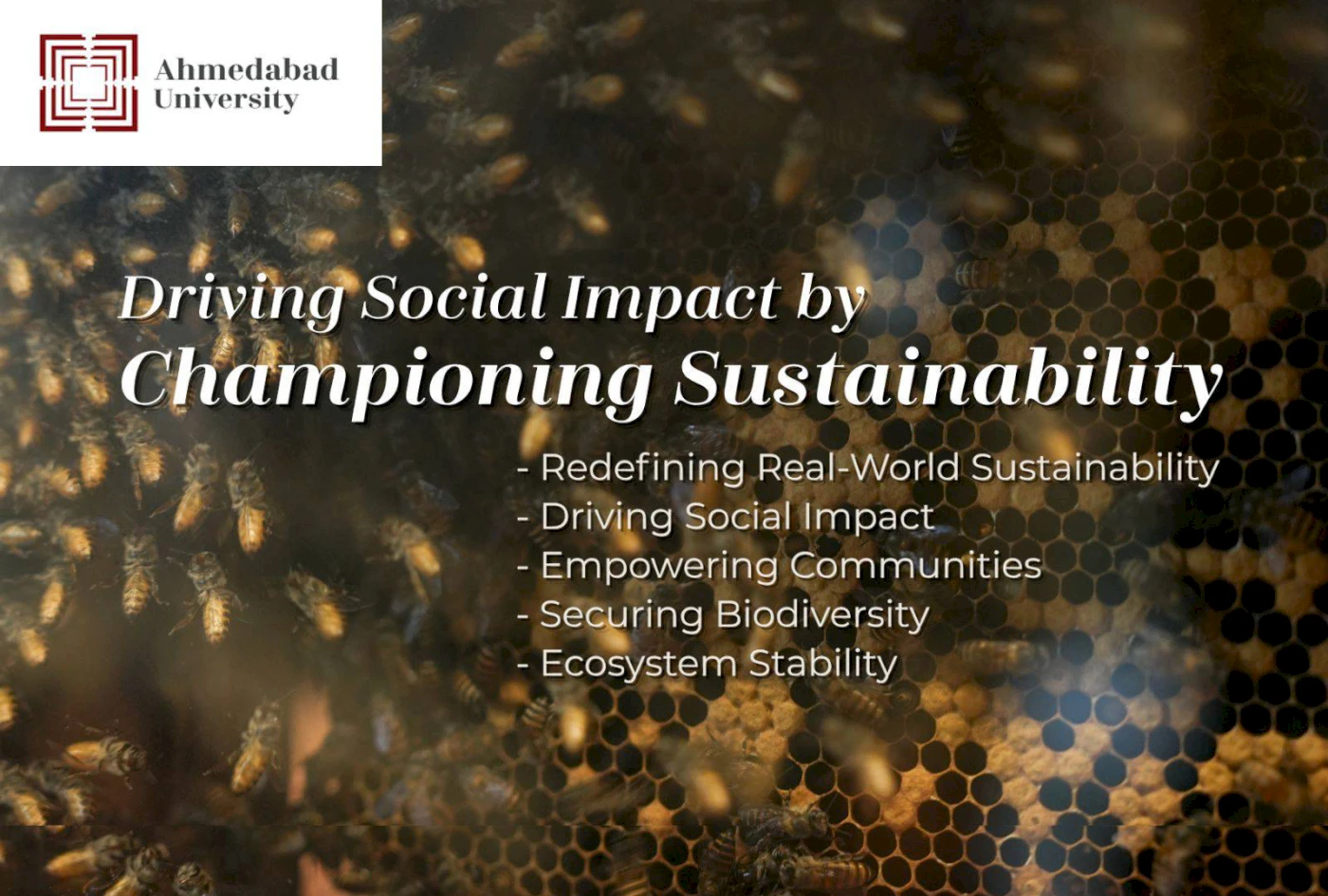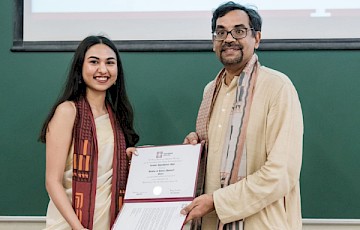2 July 2025
Driving Social Impact by Championing Sustainability

"Sustainability is not a mere buzzword, a lifestyle choice, or something that ends with replacing single-use plastic. True sustainability goes deeper. It's about maintaining and nurturing an entire ecosystem that considers not only humans but also the soil, plants, and bees. One doesn't need to wait to fix mistakes but work on preventing them. This principle brought me close to Project Adopt a Queen (PAQ), and today, it has become an integral part of my life and vice versa," said Poorav Shelat, an Ahmedabad University alumnus, who started as a student intern at Project Adopt a Queen and has evolved into a core team member today.
A graduate of the Integrated MS programme (Class of 2024), Poorav quickly ascended the professional ladder in just three years! Poorav's interest was piqued by this unique initiative while studying at Ahmedabad University. He simultaneously completed his academics and pursued working with the PAQ team as it aligned with his core passions: to actively apply his entrepreneurial spirit, to genuinely understand, experience, and implement sustainable practices on the ground, and to employ his academic learnings in real-life situations. Reproduced below is the interview of Poorav, who takes us on his journey and describes what contributed to his growth and aspirations.
What inspired you to work with Project Adopt a Queen?
There have been multiple points of inspiration that led to my association with this project. In my formative years, I learned that honeybees are crucial for 80 per cent of our food, including fruits, vegetables, and even crop seed generation. For instance, onion seed production used to be 6,000 kg, but it has now reduced significantly due to the decline in wild bee colonies—a 90 per cent reduction. This sharp decline also contributes to inflation in food prices. Honeybees provide pollination that significantly improves both crop yield quality and quantity. Another example is when bees pollinate crops like strawberries, they help them retain ideal shape, size, colour, texture, and fragrance—only if a bee visits the flower 7–8 times. That’s the power of pollination
Secondly, they offer farmers an alternative to current agricultural practices, leading to zero pesticide use on crops. However, the main issue is that farmers don’t know where to source honeybees from. This gave our founder the realisation that the problem isn't honey itself—it’s the process of beekeeping. That insight led to the development of technologies designed to help farmers and improve upon the quality of produces. This entire idea seemed very appealing to me, as it aligns perfectly with my core philosophy, which I honed at Ahmedabad University.
How did your personal aspirations align with its mission?
I always wanted to be an entrepreneur, to build something truly meaningful. I saw that this company already aligned with the vision I had for an ideal ecosystem. So, I chose to join and grow with it. My experience across operations, finance, and on-ground work has been extensive—more than most people my age. What truly inspired me is the opportunity to help others, interact with real India, and build something that touches multiple lives. I learned to implement sustainable practices on ground through introduction of bees into farmlands. It helped me engage not just with environmental sustainability, but also financial sustainability (through fair trade practices) and social sustainability (by empowering farmers and communities).
What excites you the most about the project?
What truly excites me is the comprehensive output of Project Adopt-a-Queen. It's more than just providing bees. It's about offering a holistic platform. Today, farmers often sell their produce without securing desirable prices. Our intervention directly addresses this by ensuring that their quality crops are recognised and fairly priced. The management of beehive placement occurs at the farm level, while engagement with the PAQ community occurs at the consumer level. We create a direct link between producers (farmers) and consumers (urban citizens), meaning producers benefit from enhanced yields while consumers access clean, high-quality food. However, the benefits extend significantly beyond this.
Personally, one of the most heartwarming results has been preserving our intangible heritage. For example, in Dang, Gujarat, our hives greatly enhanced gooseberry (Amla) production. This Amla was subsequently used to recreate a 110-year-old Chyawanprash recipe from the Vaidhya family (healers specialising in herbal medicines) in Dhal ni Pol, Ahmedabad, combining our honey with these specially pollinated fruits. As a consumer, you receive these unique products at competitive prices with the assurance that the earnings directly support the farmer's welfare and fair-trade pricing.
How has Ahmedabad University played a role in your success story?
Ahmedabad University supported my aspirations throughout, both at an institutional and an individual level. My background was in Life Sciences, and I worked under Professor Krishna Swamy, an Associate Professor at Ahmedabad University's School of Arts and Sciences. I wasn't a great student in terms of traditional academics, but I was invested in this work—and Professor Krishna Swamy supported me throughout, which has been crucial for my journey.
The project refers to helping hives in poor conditions by introducing international-quality hives built using global standards and technologies the team developed. When someone adopts a hive, we replace these faulty hives with scientifically designed ones to support bee health and optimise hive functionality. Ahmedabad University professors and staff saw the merit of this vision and have been instrumental in helping me inch closer to my goal. Besides Professor Krishna Swamy, Professor Ashim Rai and Roopal Shah from the University Office have adopted hives, and Professor Bhuvan Pathak has agreed to join as an advisory mentor to our foundation.
Beyond individual mentorship, how did the broader institutional environment and resources at Ahmedabad University contribute to your development?
As far as institutional support is concerned, the University truly laid the foundation for my present and future. It helped me discover myself. I always felt I had potential but lacked a platform to realise it. The interdisciplinary approach, combined with hands-on opportunities, such as managing events, running a club, working closely with professors, and handling research, brought that person out of me. It gave me the confidence to wear multiple hats and to build something with tangible impact.
Concluding the insightful conversation with a powerful message for current and future students, Poorav says that one should not limit oneself at any point. They should use University resources to the fullest, as it is rare that one place offers so many learning curves. One must keep exploring, to not get too transactional in life, and to always be authentic to oneself.



